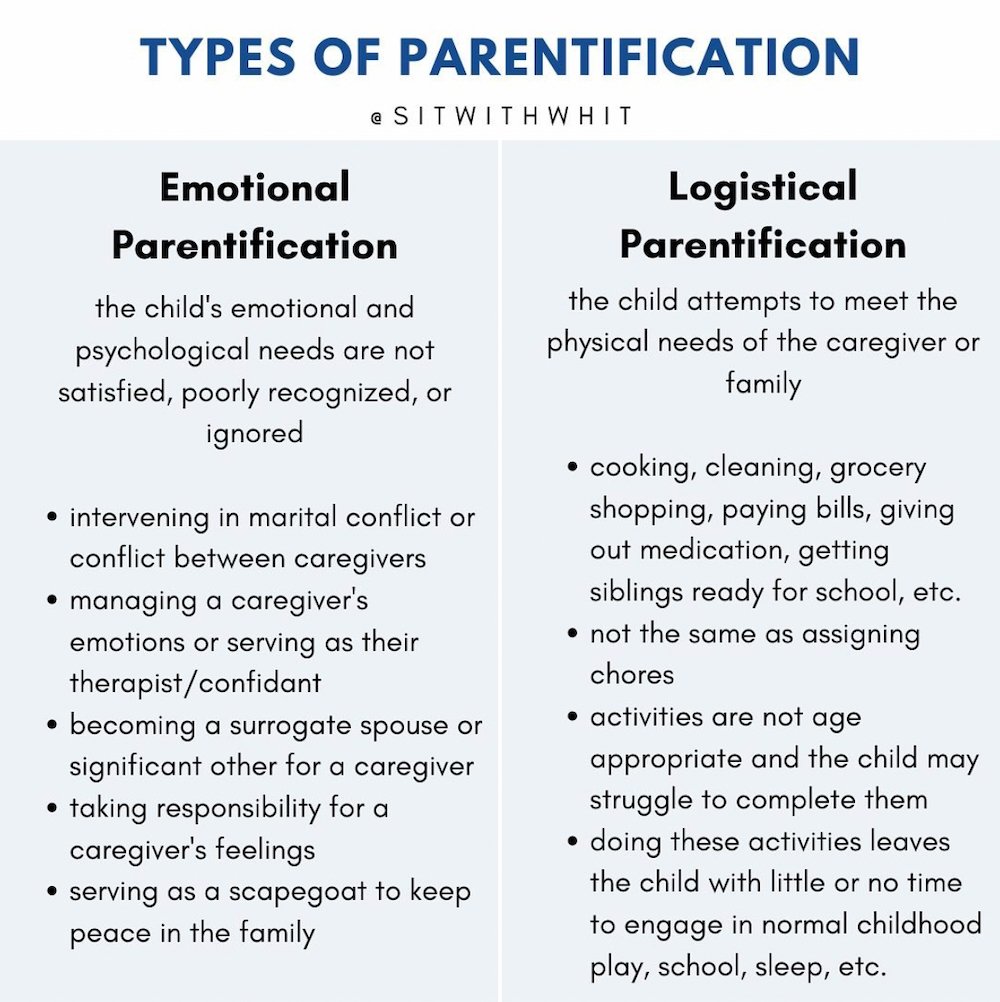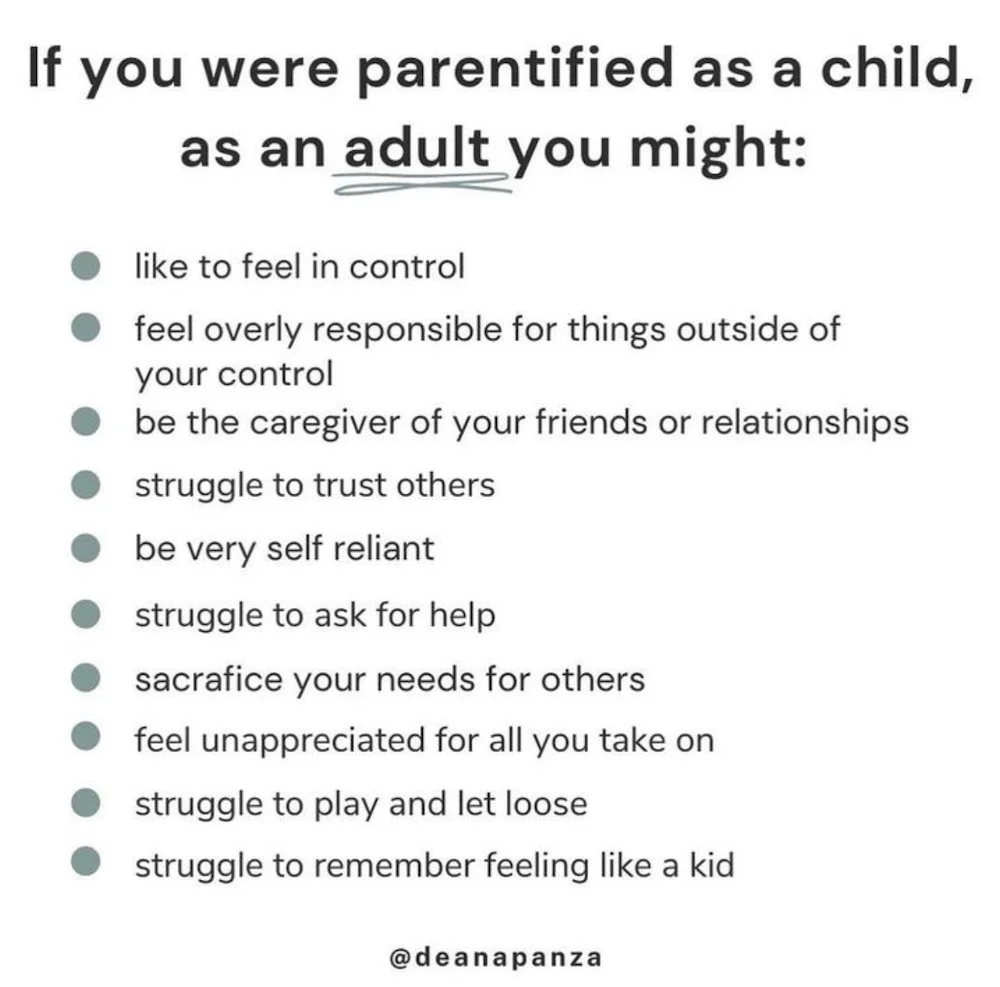What Is Parentification?
by Marissa Pomerance
Were you the “responsible” and “mature” child?
This article is for you.
After countless hours and even more dollars spent on therapy, we’ve learned that as children, being made to feel responsible for one or both of our parents, even though we might have described ourselves as “strong” and “self-sufficient” at the time, was an enormous burden to bear. Acting as our parents’ therapists, or managing fights between our parents and siblings, or telling them to stop spending money on things we didn’t need, or hearing about their financial problems and being an emotional receptacle for their fears, wasn’t about us being mature. It was about them placing supremely adult ideas onto us because they weren’t able to self-regulate.
And it has a name. It’s called “parentification.”
Psychotherapist Whitney Goodman tell us that parentification is “when a child is forced to take on the role and responsibilities of an adult,” and these responsibilities are “excessive in relation to their age” and stage of development.
And it may be the reason for some of our hardest-to-shake habits: perfectionism, people-pleasing, our inability to trust anyone outside of ourselves.
We’ll explain.
What parentification looks like.
Let’s be clear: parentification isn’t the same thing as just being a “responsible,” or Type A kid. It’s a role reversal with your parent.
Cooking for your siblings every night at age of 9 years old, is parentification.
Being your mom’s shoulder to cry on after her most recent breakup, is parentification.
Paying the utility bills because your parents always forget to do it and you don’t want the lights to be shut off again, is parentification.
Everything that Lorelai and Rory did on Gilmore Girls, was parentification.
What parentification is NOT is being emotionally mature for one’s age, or helping out around the house here and there, or being proactive and organized with homework.
“Parentification is not a one-time occurrence or the same things as doing chores,” explains Goodman. “The behaviors are repeated over time and they are excessively challenging for the child's age. For example, a 5-year-old being routinely responsible for making his dinner would likely result in parentification. But giving this task to a 17-year-old would be developmentally appropriate and a teachable moment.”
And where it becomes particularly harmful is when it escalates from an occasional occurrence to a pattern to a solidified role in the family where a child is consistently expected to take on the emotional, physical, or financial responsibilities of an adult.
Why does this happen?
Hint: it’s not just because some parents are awful.
Most parents don’t consciously set out to parentify their children; in some cases, they were parentified as children themselves, and are parenting kids the only way they know how—the same way that they were parented.
There are also a lot of good, well-meaning parents who are stressed and overwhelmed, lacking resources, time, and support, so they “recruit their children to help them run the household or be their emotional support person,” says Goodman. “This tends to happen a lot in families with one older child and another (or several) younger children. The older child ends up stepping in to be another surrogate parent.”
Sometimes, parents are negligent, or wrapped up in their own lives, or narcissistic, or unable to meet their own emotional needs. Or they’re struggling with substance abuse issues or mental illness, and aren’t physically or mentally capable of taking care of the family, so the child takes it upon themselves to run the household and family.
According to Goodman, parentification often happens in families where:
There was divorce or separation.
There is a chronically ill parent or family member.
Parents or caregivers are not able to fulfill their roles and responsibilities (physically and/or emotionally).
There is excessive or problematic parental drug and alcohol use.
How does this screw us up as kids and later, as adults?
Even if the pattern of parentification is unintentional, the parentified child is missing out on actually being a child.
Parentification can affect a kid’s attachment style, lead to them feel like their needs are unmet, and create chronic levels of stress that lead to anxiety, depression, abandonment issues, trust issues, anger, and resentment. Being parentified causes a child to feel responsible for the members of their family, which is a HUGE burden to put on anyone, let alone a kid. And if things don’t get better, or if their family members struggle, they learn to blame themselves, and feel like they have to be the ones to “fix” everything.
Parentified kids develop strategies to survive, that might serve them as kids, but cease serving them as adults. They “may have become extra compliant because they thought if they stayed out of the way, they would be loved. They may have learned that not having needs was rewarded. They may have tried to be perfect because if they were perfect, the wouldn't be disappointed or disappoint others. They may have learned the only person they could trust and rely on was themselves, and that their value is tied to what they can do and that love depends on their performance,” says Goodman.
And of course, all of this follows us around as adults, leading us to perfectionism, people-pleasing, anxiety, the need to solve everyone’s problems, enmeshment, no boundaries, an inability to meet our own needs, insecure attachment styles, and more.
This doesn’t mean parentified kids will be completely screwed up as adults—there are a few positive, adaptive things they may have learned as well. According to Goodman, here are the some of the positive, “adaptive” and negative, “destructive” consequences of being parentified:
Adaptive Consequences
Develops self-reliance (when the family shows gratitude for their labor)
Builds sense of self worth
Child feels helpful and needed
Encourages them to apply target-focused strategies when problem solving
Can develop social competencies
Learns responsibility
Learns how to care for others
Builds resiliency
Destructive Consequences
Child cannot perform their own developmental tasks
Leads to depression, anxiety, physical health symptoms, etc.
Creates difficult relationships with adults
May associate with people older than them, putting them at risk
Leads to explosive anger or passiveness
Can be very controlling and need immense structure to feel safe
Difficulty differentiating themselves and becoming independent from the family
Trouble regulating emotions
Trouble with impulse control
Sense of guilt
Trouble with sleep, school, work, and other tasks
How to move on as an adult, and not pass on the parentification like an inheritance.
When it comes to addressing the side effects of parentification-- like perfectionism, anxiety, and enmeshment--well, those all require their own articles.
But how do we continue to have a relationship with parents who parentified us? For some, starting with a simple conversation with our parents might help, but Goodman warns that not all parents will be open to this conversation. In fact, some may “respond dismissively with statements like ‘you have no idea how hard it was for me,’ ‘you’ll get it when you have kids,’ or ‘other kids had it way worse,’” says Goodman.
Ultimately, she suggests it comes down to deciding for ourselves if “having a relationship with our parents hinges on them realizing this behavior and taking responsibility for it.” For some of us, these acts of parentification might be forgivable, and possible to navigate as an adult with healthy boundaries and a lot of therapy. For others, they may not be.
But what if they’re now doing this to our own kids? Well, gently pointing out the behavior to them is key. “Like any new ideas, I think it’s important to introduce it slowly, with compassion, and seek to inform not shame,” she says. An example might look like saying, “‘Mom my daughter is only 2 so we are not asking her to clean up the table after her meal yet. We show her that we clean up after the meal and when she’s ready to take that on she will learn.’”
And finally, how do we ensure we’re not doing this to our own kids? By letting them have the time and space to be kids who enjoy life without the pressures of adulthood. This means:
Not treating them like a friend or confidante.
Maintaining the hierarchy of the family—ultimately, the emotional, financial, and physical responsibilities of the family should be managed by the parents, not by the kids.
Ensuring that we ourselves, along with our partners, have the support to manage the parental and household tasks on our own.
Allowing our kids to be independent.
Not delegating tasks to our kids that would make them feel responsible for us.
And finally, “make sure that the tasks you are giving your child are age appropriate and developmentally appropriate,” Goodman suggests. “Kids need time to be kids and they also need to learn how to complete tasks and face challenges.”
To help learn more about ourselves and our own history of parentification, Goodman has a robust, helpful workbook for adults who were parentified as kids HERE.
Marissa Pomerance is the Managing Editor of The Candidly. She’s a Los Angeles native and lover of all things food, style, beauty, and wellness. You can find more of her articles here.










